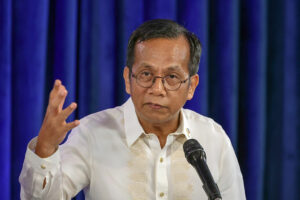THE GOVERNMENT needs to push competition policy and legislation to make the economy more efficient as companies gear up to enter international markets, National Economic and Development Authority (NEDA) Secretary Arsenio M. Balisacan said.
“Competition policy can be used to improve how markets work, even as businesses scale up their operations,” he said during webinar organized by the Asian Development Bank (ADB) Tuesday.
Mr. Balisacan was one of the editors of the ADB’s “Designing Competition Policy for Economic Development in Asia and the Pacific” report.
The report singled out market rules or structures that confer unfair advantages to certain businesses, limit consumer choices, reduce product and service quality, and lead to higher prices.
“Just to be sure, nothing is inherently wrong with bigness or dominance, but it must not be abused or used to foreclose competitors in both input and output markets,” he added.
He warned of the risks of “picking winners,” resulting in significant waste in the allocation of scarce public resources and worsening inequality.
He said the Philippine approach to promoting competition includes the Konektadong Pinoy bill, which seeks to make internet access more affordable and equitable even in remote areas by removing barriers to entry in data transmission.
However, the report noted that government policy may itself be the source of anticompetitive practices.
He cited the example of the Philippine Bureau of Plant Industry, which issues import permits for onions to a few large importers, giving them significant market power.
In terms of mergers and anti-competitive conduct involving multinational corporations, the ADB report cited the Grab acquisition of Uber in Southeast Asia, which prompted the Philippine Competition Commission (PCC) and the Competition and Consumer Commission of Singapore to sign a memorandum of understanding for cross-border cooperation.
The PCC was set up in 2015 and became fully operational in 2018.
It is a quasi-judicial body empowered to regulate anticompetitive behavior and review mergers and acquisitions that may reduce competition.
“In the Philippines, we are able to advocate for pro-competitive policy decisions. However, the challenge lies in creating governance mechanisms that institutionalize this practice so that we do not have to rely solely on individuals,” Mr. Balisacan said.
Industrial policy can be harnessed to promote scale without favoring any one particular group or business, he added.
Mr. Balisacan said competition policy can aid ease of doing business, punish cartels and those abusing their market dominance, and object to mergers and acquisitions that tend to reduce competition.
“While regulatory agencies are given their respective mandates under different laws and statutes there is an overarching framework provided the Philippine Development Plan (PDP) 2023-2028,” PCC Commissioner Lolibeth Ramit-Medrano said.
The PDP is the national blueprint for economic and social development.
She cited chapter 10 of the PDP which tackles the promotion of competition and improvement of regulatory efficiency.
“We have constructive engagement and productive working relationships with a lot of these regulators,” she said. — Aubrey Rose A. Inosante

